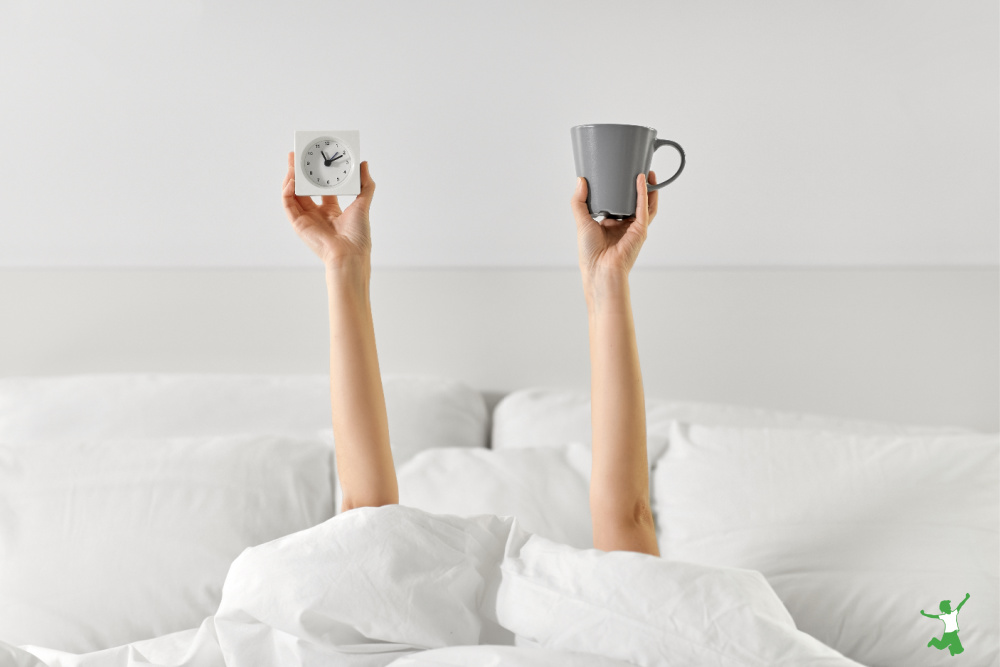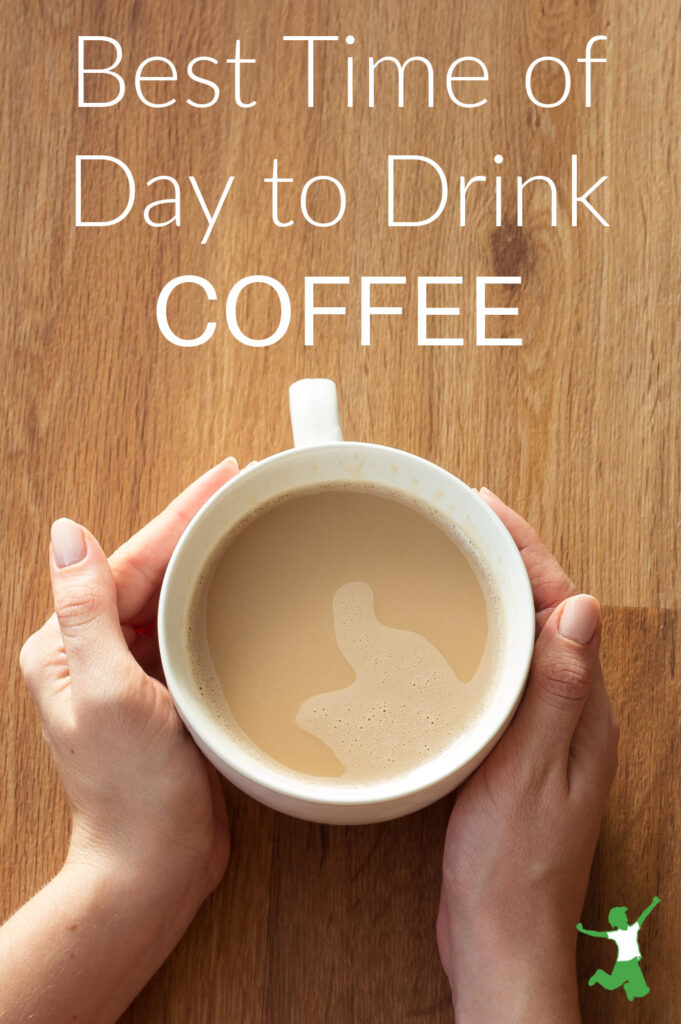Table of Contents[Hide][Show]
The best time in the morning to drink coffee to encourage the production of serotonin and maintain a balanced mood all day long.

I spent the entire first day at the International Wise Traditions Conference one year camped out in the room where Julia Ross was speaking.
Julia Ross is the acclaimed author of the books The Mood Cure and The Diet Cure.
It was my first opportunity to hear her speak, and I was not disappointed.
I took boatloads of notes that day and have enough material for several blog posts which I will write up in the coming weeks.
Today, however, I want to specifically address Julia’s discussion about coffee.
Julia Ross’ take on coffee is different from other speakers I have listened to before.
I wanted to share her warning about it because I think it’s something most coffee drinkers have no idea about.
Julia says that her main objection is that people drink coffee first thing in the morning when they get up. This typically results in skipping breakfast altogether because coffee is a strong appetite suppressant.
Not to mention that coffee reduces (not increases as popularly believed) blood flow to the brain by about 25%.
Worst Time for Coffee is First Thing in the Morning
Skipping breakfast is a big no-no and not just because it increases your chances of overeating especially starches and sugars later in the day.
Skipping your morning meal does a number on your body’s ability to produce the neurotransmitter serotonin which is derived from the amino acid tryptophan.
Tryptophan, like all the amino acids, is contained in protein.
Meat is the best source of tryptophan but only from animals roaming on pasture (corn contains almost NO tryptophan so don’t eat beef from corn fed cattle or eggs from primarily corn/soy fed chickens).
Protein (food) —–> Tryptophan (amino acid) —–> Serotonin (neurotransmitter) —–> Melatonin (hormone for restful sleep)
Serotonin is what helps you feel happy, calm, and self-confident even in the face of stress
. Moreover, ample serotonin is important for a restful night’s sleep as the body converts serotonin into melatonin at dusk. Inadequate melatonin results in insomnia problems.
Skipping breakfast in the morning short circuits the body’s ability to produce adequate serotonin throughout the day.
While eating protein later in the day definitely helps, your body still ends up playing serotonin catch up all day every day due to missing breakfast.
Julia says that we all need about 20-30 grams of protein 3X per day to fulfill our body’s requirement for amino acids in order to produce adequate neurotransmitters like serotonin.
If you are already deficient in serotonin, supplementation may be required for a short time to regain neurological balance.
This topic of neurotransmitters tends to get rather complicated, but the bottom line is this:
If you must drink coffee, then at the very least, wait until after breakfast to do it!
This way, the impact on your serotonin levels will not be as severe as drinking coffee first thing in the morning and skipping breakfast due to the appetite-suppressing effects.
You may find that this one simple change alone will help balance emotions the rest of the day.
Feelings of happiness, emotional flexibility, and stress reduction are common once this simple change is made.
How to Replenish Serotonin
Do you suspect that your serotonin levels are in the tank and you need neurotransmitter supplementation?
Clues would be that you grapple with worry, anxiety, OCD thoughts or actions, depression, panic attacks, and/or chronic insomnia.
In that situation, Julia Ross recommends this dosage with the amino acid tryptophan:
- 5-HTP (suggested source): 50 mg in the mid-afternoon and before bedtime.
OR
- L-tryptophan (suggested source): 500 mg in the mid-afternoon and again before bed especially if insomnia is a problem.
Note that 5-HTP is cheaper than L-tryptophan but some people get nausea from it, so switch to L-tryptophan if 5-HTP doesn’t work for you.
For children, start with a fraction of the dose above and only use L-tryptophan.
Raise the dosage as needed to eliminate low serotonin symptoms.
Next Steps
Once you’ve put off AM coffee until after you eat, you might perhaps feel motivated to try to shake the habit completely.
According to Julia Ross, people who crave chocolate, coffee, alcohol, and even exercise are typically low in the neurotransmitter endorphin.
Using supplementation of amino acids that are precursors to endorphin may help in trying to shake the coffee habit completely. These include:
- Amino acid d-phenylalanine (DPA) (suggested source): 500 mg, 2-4X/day. Use DPA if you are a daily coffee drinker and also an anxious person.
OR
- Amino acid d-phenylalanine (DPA) bound to the amino acid I-phenylalanine (LPA) – known in combination as DLPA (suggested source): 500 mg, 2-3X/day. Use DLPA if you crave the energizing effects of coffee and are not typically an anxious person.
Do you think a deficiency of neurotransmitters might be the reason some folks love their coffee so much?
Are you game to try changing when you drink AM coffee to help balance brain chemistry? Or, does it make more sense to switch to a noncaffeinated beverage like dandelion coffee instead?
Please share your thoughts on this and personal experience in the comments!

More Information
The Truth About Your Morning Coffee Fix
How Bulletproof Coffee Shoots You in the Foot








I usually never drink coffee the first two hours upon rising. I take LPA and have for about two yrs and LOVE it! It affects people differently so even if a person is anxious,I have seen LPA work to calm them down. Dandelion root does not work for me, as it induces vertigo but I also have a couple of clients who cannot drink it either. Same with green tea. Causes me severe vertigo.
DPLA I haven’t tried simply because I am happy with the LPA.
5-htp made me too robotic. I took the smallest dose possible on an empty stomach and when that didn’t work, I tried a full stomach. Neither way worked so I went back to Ashwaganda and am sticking to that. Great stuff.!
Good article. I’ve been reading other articles that speak to the timing of coffee as well. It seems I don’t even think until I have that first cup of coffee in my hand. The idea of having a breakfast first is daunting. I don’t disagree with the need to push coffee off until after breakfast, I just need to figure out how to do it!
Nice article. I drink coffee at least 1x/day. But for about 3 months, I had reduced coffee to only once a week (Saturday). After the awful withdrawals period I felt super awesome! My breath was fresh, had stable energy throughout the day, woke up fresh, went to bed early, slept well, worked smarter, and my head of hair began to grow back!!!
Well, I’m back drinking 1x coffee daily, and the symptoms returned and head of hair is falling/thinning. I’m afraid to go back to 1x/week because of the terrible withdrawal symptoms.
great post! Like you, I drink coffee daily. I write about it too. And I like reading great posts with all the various coffee health benefits like this one. ????
What’s your take on green coffee beans?
I’ve been fond of sweetened high caffeinated coffee and to think that it won’t be that serious. But after reading this article, it made me realized that it really has the scary stuff especially when used too much.